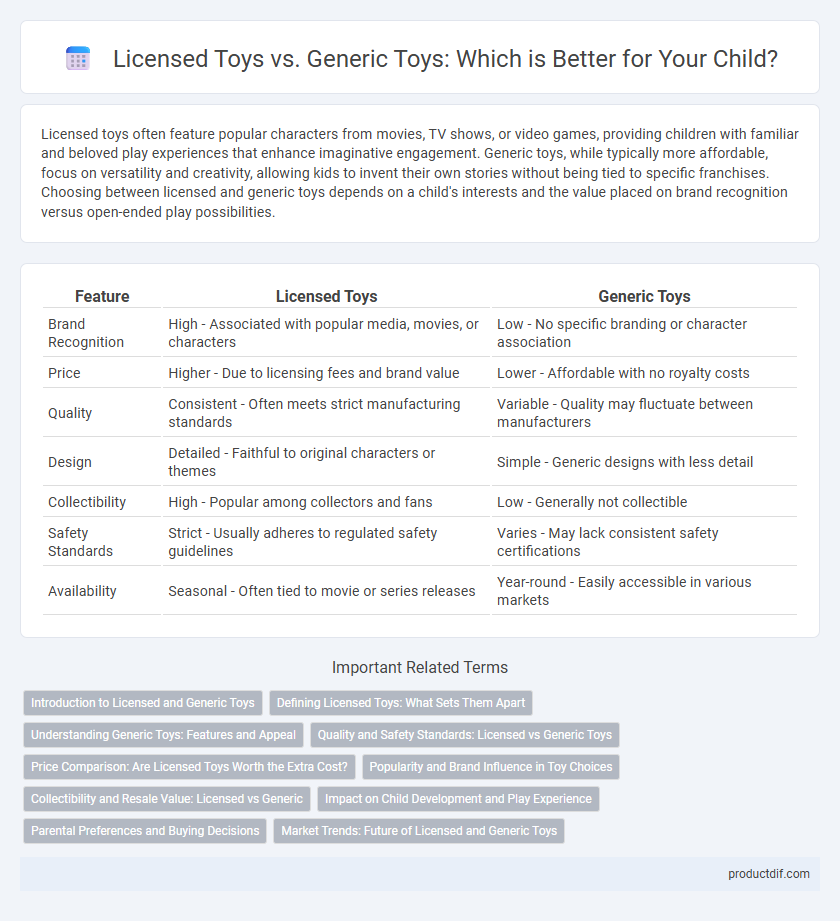Licensed toys often feature popular characters from movies, TV shows, or video games, providing children with familiar and beloved play experiences that enhance imaginative engagement. Generic toys, while typically more affordable, focus on versatility and creativity, allowing kids to invent their own stories without being tied to specific franchises. Choosing between licensed and generic toys depends on a child's interests and the value placed on brand recognition versus open-ended play possibilities.
Table of Comparison
| Feature | Licensed Toys | Generic Toys |
|---|---|---|
| Brand Recognition | High - Associated with popular media, movies, or characters | Low - No specific branding or character association |
| Price | Higher - Due to licensing fees and brand value | Lower - Affordable with no royalty costs |
| Quality | Consistent - Often meets strict manufacturing standards | Variable - Quality may fluctuate between manufacturers |
| Design | Detailed - Faithful to original characters or themes | Simple - Generic designs with less detail |
| Collectibility | High - Popular among collectors and fans | Low - Generally not collectible |
| Safety Standards | Strict - Usually adheres to regulated safety guidelines | Varies - May lack consistent safety certifications |
| Availability | Seasonal - Often tied to movie or series releases | Year-round - Easily accessible in various markets |
Introduction to Licensed and Generic Toys
Licensed toys are products officially authorized by popular franchises, featuring characters and designs from movies, TV shows, and video games, ensuring authenticity and brand recognition. Generic toys lack official licensing and do not use specific character trademarks, often offering broader imaginative play without brand affiliations. Both types cater to different consumer preferences, with licensed toys appealing to fans of intellectual properties and generic toys providing versatile options.
Defining Licensed Toys: What Sets Them Apart
Licensed toys are products officially authorized by the original intellectual property holders, featuring characters, logos, or themes from popular franchises like Disney, Marvel, or Star Wars, which enhances their appeal and authenticity. These toys often ensure higher quality standards and exclusive designs, securing a connection to the original media content that generic toys lack. The added value of licensed toys lies in brand recognition and the ability to attract fans seeking collectibles or products tied directly to their favorite movies, TV shows, or video games.
Understanding Generic Toys: Features and Appeal
Generic toys often feature simple designs and are made from cost-effective materials, making them more affordable than licensed toys. These toys appeal to consumers seeking budget-friendly options without brand-specific themes, offering versatile play experiences. Their broad compatibility with various playsets enhances imaginative play, attracting families looking for accessible and durable toy alternatives.
Quality and Safety Standards: Licensed vs Generic Toys
Licensed toys adhere to strict quality and safety standards set by both manufacturers and licensors, ensuring materials are non-toxic and components meet regulatory requirements such as ASTM F963 and EN71. Generic toys often lack rigorous testing, increasing risks of harmful substances, choking hazards, and structural weaknesses. Parents seeking reliable safety and durability typically prefer licensed toys backed by well-known brands and certification labels.
Price Comparison: Are Licensed Toys Worth the Extra Cost?
Licensed toys often come with higher price tags due to brand recognition, original character designs, and official quality control. Generic toys provide more affordable alternatives but may lack the detailed features and authenticity that fans seek in licensed products. Evaluating whether licensed toys are worth the extra cost depends on factors like collectible value, durability, and personal attachment to the brand or character.
Popularity and Brand Influence in Toy Choices
Licensed toys, featuring characters from popular movies, TV shows, or video games, dominate market popularity due to strong brand recognition and fan loyalty, driving higher consumer demand and sales. Generic toys lack specific branding, which often results in lower visibility and limited appeal among children and collectors, despite offering cost-effective alternatives. Brand influence significantly shapes toy choices, with licensed products benefiting from established franchises that create emotional connections and perceived value.
Collectibility and Resale Value: Licensed vs Generic
Licensed toys often have higher collectibility and resale value due to their association with popular brands, franchises, and limited editions, attracting dedicated collectors. Generic toys generally lack brand affiliation, resulting in lower demand in secondary markets and limited appreciation over time. The rarity and official licensing of toys strongly influence their potential for long-term value growth among collectors.
Impact on Child Development and Play Experience
Licensed toys featuring popular characters from movies, TV shows, or books often enhance a child's imaginative play by providing familiar narratives and emotional connections, boosting creativity and storytelling skills. Generic toys encourage open-ended play that fosters problem-solving, motor skills, and independent creativity through versatile and non-specific designs. The combination of licensed and generic toys can create a balanced play experience that supports diverse developmental benefits and cognitive growth.
Parental Preferences and Buying Decisions
Parental preferences heavily influence buying decisions, with licensed toys often favored for their association with popular characters and perceived higher quality, enhancing children's engagement and satisfaction. Generic toys, while more budget-friendly, may lack the brand recognition that reassures parents about safety and educational value. Studies show that parents prioritize licensed toys when purchasing gifts, driven by trust in established franchises and the desire to meet children's expectations.
Market Trends: Future of Licensed and Generic Toys
Licensed toys consistently dominate the market by leveraging popular media franchises like Marvel, Disney, and Star Wars, driving higher consumer demand and premium pricing. Generic toys gain traction through innovative designs and affordability, appealing to budget-conscious parents and expanding market reach. Future trends indicate a balanced coexistence where licensed toys capitalize on brand loyalty while generic toys focus on customization and eco-friendly materials to capture new segments.
Licensed toys vs generic toys Infographic

 productdif.com
productdif.com